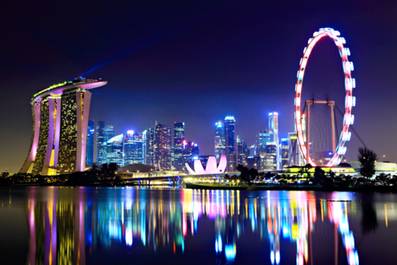Surveys
Singapore Sizzles As Most Expensive City; Asian Hubs Among World's Priciest - EIU Study

In figures unlikely to surprise readers, Singapore retains its top spot as the world's most expensive city, according to results from a research and publishing house.
New figures from the Economist
Intelligence Unit show that Asia has the dubious honour of
boasting five of the world’s most expensive cities, with
Singapore ranked in first place, ahead of Hong Kong, with
Switzerland’s Zurich in third.
The survey, using a WCOL Index (with New York at a base of 100),
shows Singapore at 120, unchanged in 2017 from a year before,
while Hong Kong is at 114, also unchanged, and Zurich is 113,
down by one ranking from last year. Tokyo, at 110, is up seven
places, while Osaka in Japan is up by nine, the survey
showed.
Seoul in South Korea is at 108, followed by Geneva at 107,
then Paris at 107, New York at 100, and Denmark,
also at 100.
Interestingly, London – often grumbled over by
its inhabitants as expensive – does not make it into the top
10 rankings. The UK capital fell by 18 points in the last 12
months.
Such data, while they must be carefully interpreted, can shed
light on why wealth management firms have been shifting their
booking centres and changing business models. The sheer cost of
doing business in Singapore, for example, might explain why,
despite Asia’s vibrant economy of recent years, several private
banks such as at Societe Generale, Barclays, ABN AMRO and ANZ
have been sold to local players. Banks have typically said they
have not achieved critical mass to justify costs of doing
business.
Singapore sizzles
“Despite topping the ranking, Singapore still offers relative
value in some categories, especially compared with its regional
peers. For categories such as personal care, household goods and
domestic help Singapore remains significantly cheaper than its
peers, although it remains the most expensive place in the world
to buy and run a car, as well as the second-priciest destination
in which to buy clothes,” the report said.
“In terms of food and drink the cost of living in Singapore is on
a par with that of Shanghai in China. Seoul, Tokyo and Osaka
present the three most expensive places in the world to buy
staple goods. In Seoul, topping up a grocery basket is almost 50
per cent more expensive than in New York,” it
continued.
“Last year deflation and devaluations were a prominent factor in
determining the cost of living, with many cities falling down the
ranking owing to currency weakness or falling local prices. Both
prices and a number of currencies rallied during 2016 and,
although inflation in many cities has remained moderate, the
impact is reflected in the average cost of living,” the EIU
said.
“Taking an average of the indices for all cities surveyed using
New York as base city, the global cost of living has risen to 74
per cent, up slightly from 73 per cent last year. This remains
significantly lower than five years ago when the average cost of
living index across 132 cities was at an all-time high of 93.5
per cent,” it continued.
